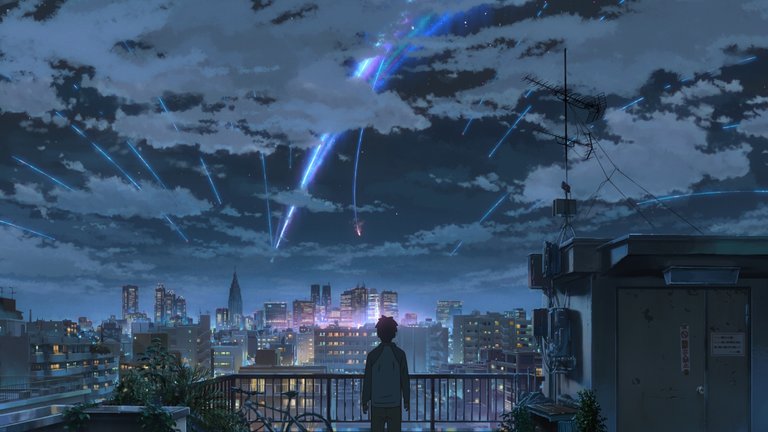
Makoto Shinkai’s films evoke a world of melancholy. His characters yearn for lost romance, resultantly residing in their own limbos, longing for the past. Despite the somber attitude pervading his films, Shinkai proves to be an idealist, banishing pessimism by introducing melodrama, contrivance or even magic. Shinkai’s conclusions at once substantiate his characters as resilient and determined, but underneath their heroism lies a sacrifice.
In this regard, Shinkai’s focus on telling a more epic story in his new film, Your Name, results in his most brazen work. Paradoxically, Your Name has a character-driven narrative but doesn’t provide viewers with the inner-workings of those same characters.

Your Name centers on Taki Tachibana (Ryunosuke Kamiki) and Mitsuha Miyamizu (Mone Kmishiraishi), two high-schoolers living opposing lives. Taki resides in the sprawling Tokyo, where he works as a waiter. Mitsuha lives in the small, fictional village of Itomori, where she carries out her duty as a Shinto priestess but longs for a more exciting life, and the opportunity to leave her family-history behind.
Mitsuha’s mother passed away when Mitsuha was only a child. Against the wishes of his mother-in-law, Mitsuha’s father decided to abandon the family’s Shinto shrine and enter politics, subsequently becoming mayor of Itomori. In turn, Mitsuha became a public-figure, from then on known as the daughter of the mayor and the heir to the town’s Shinto shrine. And so, she lives with constant scrutiny.

It is with fear but later excitement that Mitsuha awakens in Taki’s body, and vice-versa. The two strangers are unaware as to why the event happens, but they do figure that the switch happens at random. Ground rules are established using notes and diary entries left in one another’s phone: “No baths! No looking! No touching,” writes Mitsuha. “Don’t waste money! No dialect! Don’t be late,” Taki retorts.
Shinkai preferences the use of heavy-editing, drawing out the moods of his characters through gaps in time. In Your Name, Shinkai once again uses montage, this time rendering the initial frustration of Taki and Mitsuha into screw-ball delight. He depicts the potential havoc Mitsuha and Taki believe the other is causing in their life — Mitsuha’s developing of romance between Taki and a co-worker; Taki’s outward defiance towards school bullies. The scene ends in a fervent crescendo of Japanese rock-pop played against the split screen of Mitsuha and Taki reading their phones with growing embarrassment, each one cursing the other.

The first act of Your Name captures the joys and frustrations of late adolescence. Mitsuha and Taki serve as each other’s foil, facing problems both minor and major that the other is too fearful to overcome. The magical aspect of the story matters little and instead gives way to the glee of new experiences. Taki, in Mitsuha’s body, finds himself in awe and respectful of Mitsuha’s Shinto practices. Alongside Mitsuha’s grandmother, Taki learns how to weave special threads in which the very history of Mitsuha’s family is infused.
Within Taki’s body, Mitsuha discovers the excitement of living in a big city, finding pleasure in activities Taki has taken for granted. A café, for example, becomes a haven when Itomori’s closest offering is a coffee dispensing machine (which Shinkai later turns into a joke through the ingenuity of the plot).

Without giving too much away, a cosmic disaster befalls Mitsuha and Taki. The magic becomes the frontal aspect of the story, and the characters are subsumed by the plot. The vicissitudes of navigating life are lost in favor for the trappings of a disaster-romance film, where everything is driven towards reaching towards the film’s melodramatic climax.
If Taki and Mitsuha’s determination read as metaphors for humanity — especially as a parallel to the survivors of the Fukushima Accident, and the 2011 Tōhoku Earthquake/Tsunami — then Shinkai has foregone a key element missing in our own real world: the lack of magic, and the role of fate. Your Name begins with Taki dreaming of encountering Mitsuha. The two are tied together by the red string of fate. From the start, then, Mitsuha and Taki’s actions are guided by a force greater than the two of them, one which undermines their individuality and actions by the supposition of pre-determination.

Shinkai often uses wide-angle shots to juxtapose his characters against their landscapes, embodying the relation between their determination and desires. The technique resurfaces in Your Name and doesn’t merely cap the film’s momentum, but moves it forward. That very sense of freedom the characters yearn for, however, becomes subverted. A key moment of character development happens off-screen, and its consequences are never felt or explored. Shinkai’s stories aren’t as interesting as the characters driving them forward. While lush animation and detailed backdrops make Shinkai’s films visually stunning, without character depth, it’s a beauty which rings hollow.
Anthony Dominguez (@Dmngzzz) is an English/Film graduate from SUNY at Albany. His interests in cinema lie in independent and foreign films, as these works are less likely to be covered and consequently more likely to be forgotten. Anthony wishes to preserve their importance through his writing so others may discover these films.
Categories: 2017 Film Essays, Featured, Film Essays

You must be logged in to post a comment.